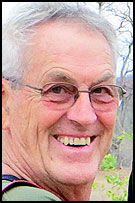Enticknap: Climate emergency sounds call for action
Climate scientists have been warning for decades of an impending global warming crisis. And it has not only it arrived, it is accelerating.
Now scientists are predicting untold suffering in a hothouse Earth beyond our control, making vast regions of the planet uninhabitable.
We need to listen to the youth leading climate protests in Oregon and around the globe. Their future depends on bold action, as they will inherit what my generation has created.
There’s nowhere to hide. Flooding, drought and wildfires, driven by climate change, pose threats to two-thirds of U.S. military installations, the Department of Defense said in a report issued to Congress last year. “The effects of a changing climate are a national security issue with potential impacts to DOD missions, operational plans and installations,” the report warned.
The science is well established: Human greenhouse gas emissions cause global warming. A review of some simple facts, based on accepted scientific data, helps explain what we’re doing to the planet: Changing the Earth’s atmosphere, resulting in a hotter planet.
As early as 1956, scientists at the Scripps Institution of Oceanography understood that burning fossil fuel left a unique molecular signature in the atmosphere. This chemical fingerprint identified human activity as the driver in increasing atmospheric carbon dioxide, and thus temperature.
Concentrations of CO2 and other greenhouse gases in the atmosphere absorb heat that would otherwise dissipate into space. The more atmospheric CO2, the more heat captured and concentrated.
Last year, human activities — notably fossil fuel burning, cement production, deforestation and agriculture — emitted roughly 43.1 billion metric tons of CO2. By comparison, all the world’s volcanoes generate only about 200 million tons annually — just 4.6% as much.
We’re now living in the warmest period in all human history. The 20 warmest years on record have all occurred in the past 22 years, according to the World Meteorological Organization.
The National Aeronautics and Space Administration and National Oceanic and Atmospheric Administration report that 2019 was the second-warmest year on record, after 2016. It capped the hottest decade since the Industrial Revolution.
Oregon State University reports global atmospheric carbon dioxide concentrations now exceed 410 parts per million. That’s a level last reached 800,000 years ago, when both global temperatures and sea levels were much higher than today.
Worldwide, the global average surface air temperature has risen about 1.8 degrees Fahrenheit. But in the Pacific Northwest, it has risen about 2 degrees just since 1900.
This number may seem like a small increase, but some greenhouse gases will remain in the atmosphere thousands of years, and continue to absorb heat throughout. That’s why the international community has pledged to hold increases in global average temperature to less than 2 degrees Celsius, about 3.6 degrees Fahrenheit, above pre-industrial levels.
As the Earth’s land surface warms, so do its oceans.
A study, published last month in “Advances in Atmospheric Studies” found the Earth’s oceans have reached the highest temperatures ever recorded. Its authors report, “The amount of heat we have put in the world’s oceans in the past 25 years equals 3.6 billion Hiroshima atom-bomb explosions. We are now at five to six Hiroshima bombs of heat each second.”
Warmer oceans mean more frequent and severe storms. As warmer water expands and ice melts, the global sea level has risen about eight inches since 1900, and the rate of rise is accelerating.
The Arctic Ocean is warming three times faster than the rest of the planet. It is expected to be ice-free during summers by 2050, resulting in extreme weather in the Northern Hemisphere.
Like Australia, Alaska is experiencing extreme drought and record highs. Alaska is warming about 2.5 times the rate of the lower 48 states, helping foster 742 wildfires last year, according to the University of Alaska’s Arctic Research Center.
More than 100 major fires burned from Siberia to Greenland to Alaska last year, consuming millions of acres and sending smoke as far south as Seattle. In June alone, these fires emitted 50 million tons of CO2 into the atmosphere — more than many European nations generate in an entire year. Climate scientists call the Arctic fires of 2019 “unprecedented.”
Closer to home, “The Blob” isn’t a new horror movie. It’s what marine scientists term an unprecedented mass of warm water that sat off the West Coast from 2014 to 2016.
But it was a horror for marine organisms. It caused mass die-offs among creatures ranging from sea birds to whales.
An estimated one million seabirds starved to death from Alaska to California. Thousands of emaciated sea lions washed ashore. Salmon and crab fisheries suffered.
The Blob generated an explosion of toxic algae. Temperatures at depths off the Central Oregon Coast ranged to 7.2 degrees Fahrenheit, or 4 degrees Celsius, warmer than normal.
Swiss climate scientist Thomas Frölicher said, “It was the biggest marine heat wave so far on record. “But he warned, “If we follow a high-greenhouse-gas-emissions scenario, these heat waves will become 50 times more frequent by 2100” — just 80 years from now.
As if that’s not enough, CO2 dissolves in the ocean, making seawater more acidic. That’s bad news if you’re a crab or oyster. as carbonic acid dissolves calcium carbonate, the main ingredient of their shells. And NOAA warns that ocean acidification is occurring faster now than at any time in human history.
As we have all observed, forest wildfires in the Pacific Northwest have become increasingly severe. That’s because reduced rain in summer and snow in winter combined with increasing temperatures to create ideal conditions.
OSU data dating back to 1900 shows wildfires were smaller and less frequent in the past. The total area burned by forest wildfires in the Pacific Northwest has increased nearly 5,000% just since the 1980s.
As of June 2019, typically wet forests in Western Oregon have seen more than double the average number of wildfires, compared to the previous decade — 48 compared with 20, according to The Oregonian.
More than 11,000 scientists signed on to a statement by lead author William Ripple, distinguished professor of ecology in OSU’s College of Forestry, that warned of “untold suffering” as a direct result.
In the scientific journal BioScience, Ripple warned last month, “Climate change has arrived and is accelerating faster than many scientists expected. Global surface temperature, ocean heat content, extreme weather and its costs, sea level, ocean acidity, and area burned in the United States are all rising. Globally, ice is rapidly disappearing as demonstrated by decreases in minimum summer Arctic sea ice, Greenland and Antarctic ice sheets, and glacier thickness. All of these rapid changes highlight the urgent need for action.”
It’s clear our house is on fire. What can we do now to save our children’s future?
McMinnville can join more than 1,341 cities and 26 countries in declaring a climate emergency, and set priorities accordingly. Individually, residents can use the Environmental Protection Agency’s online carbon footprint calculator to identify actions they can take on their own.
Other ideas include joining an organization fighting for the transition to an economy free of fossil fuel-free dependency; supporting state and federal legislation to reduce fossil fuel use; adopting a primarily plant-based diet; planting trees; and finally, voting for candidates pledging action.
For now, Earth is the only planet we know that supports life. Let’s keep it that way.







Comments
Jim
Another fluff piece written by somebody that’s lived in our state for a short period of time. We are one of the cleanest places on earth in our state. I’m tired of reading these scare tactics to frighten our children. All the bad things that this guys buddy Al Gore predicted to happen have not come true. I’m tired of people moving to this state and trying to change it. If you don’t like it move somewhere else where they want to hear your liberal rhetoric.
Don Dix
From the article -- 'We’re now living in the warmest period in all human history.' The author seems to be channeling his buddy Al Gore, who has become famous for being blatantly wrong. As for the 'claim', not even close! Look up Medieval Warm Period, Roman Warm Period, Minoan Warm Period -- all warmer than present, and have nothing to do with 'human influence'.
Arctic sea ice disappeared in 1922 -- does that matter?
Floods -- building in flood zones is not an intelligent move, wouldn't you say?
Droughts -- happen all around the world, and have been occurring for eons.
Wildfires -- most caused by accidents, faulty power lines or equipment, and, as found this year in Australia, arson. And the intensity of the wildfires can be directly related to the buildup of underbrush and deadfall that the tree-huggers file legislation and lawsuits to leave on the forest floor.
According to NASA, Antarctic ice has been growing, but go ahead and ignore that troubling fact. The article states, 'The science is well established: Human greenhouse gas emissions cause global warming.' Please notice the difference between a hypothesis (which this claim is), and a theory, which can be scientifically repeated by others (but those who make these claims won't share raw data or the method by which they came to this conclusion).
CO2 is a 'trace gas' that makes up 4ppm (4 of 10,000) of the atmosphere. Humans contribute about 7% to that total. 7% of a trace gas, really?
'Listening to our youth' (about climate change) is hearing the regurgitation of what they have been instructed to believe. There is no consideration of the facts from 'historical evidence', only the last 140 years (weather records). (cont.)
Don Dix
(cont.)
The Sun provides all the heat on Earth -- but nowhere in the article is that even considered. Wonder why? Doesn't fit the agenda-driven who make their case by exclusion of many climate-influencing factors. 'Settled science'my a**!
SandyKnoll
Peter, thanks for writing this. It will fall on many closed ears and minds, but perhaps it will help undecided thinking folks understand that we are all in this together. I'm grateful that the kids are understanding that they are the ones that need to push for change. Their actions and votes for the earth are more important now than ever before.
RobsNewsRegister
It would be easier to buy what the Climate Change folks are selling if their solutions made sense. For instance, the cap-n-trade bill in the Oregon legislature now costs $700 million while having little to no real impact on global CO2. The legislature's time would be far better spent reviewing Oregon's forestry laws with CO2 in mind to be more aggressive in planting and properly managing (e.g. thinning, cleaning out underbrush, re-planting burn areas) our forests rather than this nonsense.
Is this incompetence because these people don't really believe what they are pushing, or is this what happens to a real issue when politicians take hold of it for their own advantage?
Don Dix
Robs -- Oregon government Ds don't want to actually do anything, anytime, except come up with new schemes to extract money from the citizens. For 30 yrs.+, every session of the legislature has been a race to add another tax, fee, or fine to the cost of living in Oregon.
Every argument to support the climate change myth is easily challenged and refuted. But when the agenda is driven by the prospect of another tax windfall, never mind truth and facts, it's balls out to the finish line. Tax, tax, tax, -- waste, waste, waste! -- Oregon government in session!